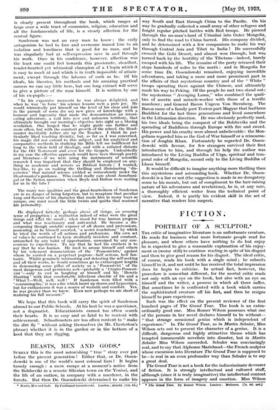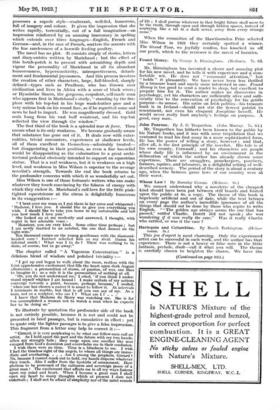FICTION;
PORTRAIT OF A SCULPTOR.* THE critic of imaginative literature is an unfortunate creature. He reads for business what more fortunate people read for pleasure, and where others have nothing to do but enjoy he is expected to give a reasonable explanation of his enjoy- ment or (worse still) to continue reading in spite of his disgust and then to give good reason for his disgust. The ideal critic, of course, reads his book with a single mind ; he submits himself to it, and not until he has received the total impression does he begin to criticize. In actual fact, however, the procedure is somewhat different, for the mortal critic reads not only with an eye on the book, but also with an eye on himself and the writer, a process in which all three suffer. But sometimes he is confronted with a book which carries the sophisticated creature off his feet, and then he resigns himself to pure experience.
Such was the effect on the present reviewer of the first hundred pages of The Grand Tour. The book is an extra- ordinarily good one. Miss Romer Wilson possesses what one of the persons in her novel declares himself to be without- " that strange occasional genius which is independent of experience." In The Grand Tour, as in Martin Schuler, Miss Wilson sets out to present the character of a genius. It is a difficult, dangerous and highly attractive theme which has tempted innumerable novelists into disaster, but in Martin Schuler Miss Wilson succeeded. Schuler was convincingly real, and to say that Alphonse Marichaud—the French sculptor whose excursion into literature The Grand Tour is supposed to be—is real in an even profounder way than Schuler is to say a great deal.
The Grand Tour is not a book for the indiscriminate devourer of fiction. It is strongly intellectual and cultured stuff, although (since it is truly imaginative) the intellectual content appears in the form of imagery and emotion. Miss Wilson • The Grand Tow. By Romer Wilson. London: Methuen. [7a. 6d. net.] possesses a superb style—exuberant, well-fed, humorous, full of imagery and colour. It gives the impression that she writes rapidly, torrentially, out of a full imagination—an impression reinforced by an amazing inaccuracy in spelling which extends over three languages—English, French and German—and, in the case of French, scatters the accents with the fine carelessness of a henwife feeding poultry.
The novel has no plot. consists simply of stories, letters and diary-entries written by Marichaud ; but the effect of this hotch-potch is to present with astonishing depth and vigour the personality of Marichaud in all its abundant humorousness, hypersensitivity, introspectiveness, detach- ment and fundamental joyousness. And this process involves the creation of other characters, large, full-blooded, sharply defined—types such as Prudhom, who has thrown over civilization and lives in Africa with a score of black wives ; or Hyacinthe Simon, the gorgeous, corpulent, self-made man who appears first in Marichaud's study, " standing by the fire- place with his top-hat in his huge wash-leather paw and a very serious look on his round face, as if he regretted some sad news he had to impart. He was magnificently dressed. Gold seals hung from his vast buff waistcoat, and his top-hat reflected the view through the window."
The first third of the book is a splendid tour de force. Then occurs what is its only weakness. We become gradually aware that substance has gone out of it. It deals now with exter- nalities, trivial encounters, experiences at shallower levels, all of them excellent in themselves—admirably treated— but disappointing in their position, as even a fine bas-relief would be disappointing as the culmination to a great archi- tectural pedestal obviously intended to support an equestrian statue. That is a real weakness, but it is weakness on a high level, and weakness in Miss Wilson is superior to the average novelist's strength. Towards the end the book returns to the profounder concerns with which it so wonderfully set out.
Miss Wilson is one of those fortunate writers who can make whatever they touch convincing by the fulness of energy with which they endow it. Marichaud's calf-love for the little pink- Lighted equestrienne at the circus is delightfully humorous in its -exaggeration :— " I bent over my roses as I put them in her arms and whispered : Madame, I love you. I should like to give you everything you wish. I should like to take you home in my automobile and tell you how much I love you
She looked up at me modestly and answered, I thought, with regret in her adorable voice : Monsieur, you are very kind. Some other time perhaps ; but I am newly married to an acrobat, the one that dances on the tight-wire.'
Ten thousand curses on the young gentleman with the diamond- headed cane I Instinct selected him as my rival. Damn his infernal smirk ! What was I to do ? There was nothing to be done, of course, but to go away."
The chapter called " A Vaporous Conversation " is a delicious blend of wisdom and polished triviality :- " I got up and began to walk about the room, restless with the faint apprehensive excitement that fills the heart upon dark August afternoons : a premonition of storm, of passion, of war, one likes to imagine it ; as a rule it is the premonition of nothing at all. Oh, you do not understand me,' I cried, if you think I under- stand myself whither I am bound I I. make certain of my actions converge towards a point, because, perhaps because,' I smiled. when one has chosen a career it is usual to follow it. At intervals I terminate in marble, but that is all you can say of me. As a man, not as a sculptor, who am I / What am I Y . .
I knew that Madame du Merry was watching me. She is far too accomplished a woman not to watch a man when he expects her to be doing so."
To illustrate by quotation the profounder side of the book is not entirely possible, because it is not and could not be presented in brief passages, but is cumulative in effect : yet to quote only the lighter passages is to give a false impression. This fragment from a letter may help to correct it :— " Girrard, it is very perplexing to be what our fellow-men call an artist. As I hold apart the past and the future with my two hands, often my strength fails ; they surge upon one another like seas escaped from God's dominion and overwhelm me in their confusion. I wish there were no time. Time is a blindness to me. I wish I bad the timeless sight of the angels, to whom all things are imme- diate and everlasting. . . . Am I among the prophets, Girrard No, because I cannot reach out to hold, my hands disperse whatever they touch. Also I suffer from the hysteria of amazement. How glorious to be possessed of the calmness and sovereign peace of a great man I The excitement that affects me in all my ways fastens upon my mind and heart. When T become a great man I shall open my heart to many thoughts which at present I dare not entertain ; I shall not be afraid of simplicity nor of the Quiet sounds of life ; I shall pursue whatever in that bright future shall seem to be the truth, through open and through hidden spaces, instead of scurrying, like a rat in a dark sewer, away from every strange noise."
When the committee of the Ila,wthornden Prize selected Miss Wilson in 1921 they certainly spotted a winner. The Grand Tour, we joyfully confess, has knocked us off our perch, which to the reviewer is the rarest of luxuries.











































 Previous page
Previous page